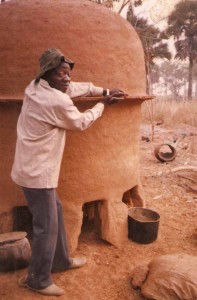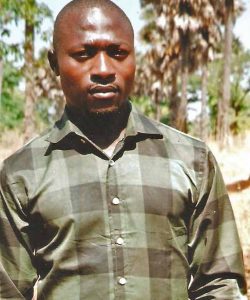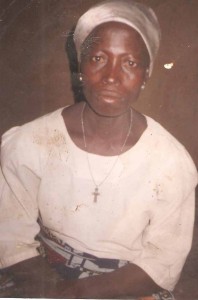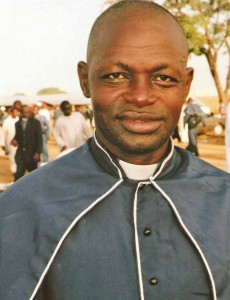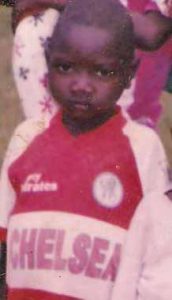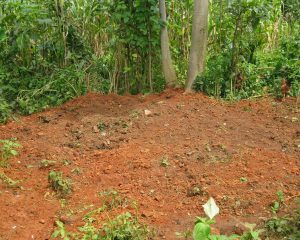ADU, Nigeria (Morning Star News) – Gabriel Anthony, 25, was steeped in quiet, prayerful devotion at 5 a.m. on Sunday (Sept. 1) in this northern Nigerian village when he heard gunshots.
“Within minutes, bullets were piercing into our rooms,” Anthony told Morning Star News. “I escaped from my room by jumping through the window.”
A half hour later, seven of his relatives in Adu village, Kaduna state, were dead, including his father, 60-year-old Anthony Nkom; his mother, 45-year-old Asabe Anthony; his brother, 35-year-old James Anthony; and another brother, 37-year-old Andrew Anthony. Also killed were three of his nephews – 5-year-old Meshack Aaron, 12-year-old Bulus James Anthony, and 15-year-old Happiness Anthony.
The bodies of Happiness and Meshack were buried in one grave, and those of the other five in another.
Besides these seven people, two other Christians in the village were killed and three were wounded in the attack by more than a dozen ethnic Fulani Muslims, Anthony said. All of those killed were members of the St. Andrew’s Catholic Church in Adu.
As Anthony’s relatives were being shot, in another part of Adu village another set of Muslim Fulani gunmen attacked the house of Joseph Abwoi, 50, killing him and his wife, Asabat Abwoi, 40. They were buried in a single grave.
The three people wounded in the attack on Anthony’s home were grandchildren of the murdered Nkom – Godiya Andrew, 9; Shenyan Andrew, 3; and Kawot, 5, he said. While Godiya was being treated for gunshot wounds at the Jos University Teaching Hospital, Kawot was taken to Kafanchan General Hospital and Shenyan was receiving treatment at the Rural Hospital Kaura in Kaduna state, Anthony said.
“By the time the Fulani gunmen had moved to other houses in the village, the sounds of gunshots had forced the over 500 inhabitants of the village to flee into the bushes, thus escaping from being killed,” he said.
Survivors fled to the town of Manchok in Kaura LGA of Kaduna state, he said.
Armed Fulani herdsmen had attacked villages in the same area on the border of two states – Attakar in the Kaura Local Government Area (LGA) of Kaduna state, and Riyom LGA in Plateau state – in a four-day Easter assault March 28-31 that killed at least 26 Christians (see Morning Star News, April 5).
The Easter violence had prompted talks between Fulani leaders and area Christians of other tribes to try to determine why the Muslims had attacked and how to bring an end to the aggression. The Rev. Yakubu Gandu Nkut, pastor of the Evangelical Church Winning All (ECWA), Zankan, said he was thus baffled about possible reasons for Sunday’s attack.
“I don’t understand the reasons behind these attacks on our people by these Fulani herdsmen,” he said. “Several meetings have been held with their leaders in order to resolve whatever are the differences. However, in spite of promises by these Fulani leaders that these attacks will not occur again, we have continued to witness these beastly attacks.”
The violence is undermining the work of various area churches, he said.
“As you are here, you can see that my family is not here in this village,” Nkut said. “The reason is because since Sunday, these Muslim Fulani herdsmen have been attacking Christian villages around here. On Monday up to yesterday [Sept. 4], some of the Muslim gunmen were here to attack this community, but they were repelled by the people. And because of this, almost everybody has left the village.”
Nkut said there has never been a time when area Christians attacked the Fulani. Christians believe Islamic extremist groups have increasingly incited Fulani Muslims to attack Christians in Kaduna and Plateau states as well as in Bauchi, Nasarawa and Benue. They fear that Fulani herdsmen, with backing from Islamic extremist groups, want to take over the predominantly Christian areas in order to acquire land for grazing, stockpile arms and expand Islamic territory.
Nkut, chairman of the Zankan chapter of the Christian Association of Nigeria, appealed to the government to take urgent action to stop the attacks.
Coma
Islamic extremists from outside of Nigeria paid to join forces with Fulani Muslims the prior Friday, Aug. 30, attacked another village in Plateau state that left a Christian in a coma, area Christians said.
The mercenaries, whose appearance and speech suggested they were from outside the country, joined with Fulani Muslims to attack church property in Dorowa Babuje, also known as Ratatis, they said. The assailants beat John Fidelis, 40, a Christian merchant, until he was unconscious.
The Rev. Luka Jang Tsok told Morning Star News he narrowly escaped death when the armed Fulani Muslims and mercenaries set fire to his Church of Christ in Nations (COCIN) building in the village, in the Barkin Ladi LGA. The village is about 140 kilometers (86 miles) from Adu in neighboring Kaduna state.
“I had to sneak out of the church compound by jumping over the fence to save my life,” Tsok said. “During the attack, the Muslim men and Fulanis, who were armed, set fire on the church, but the efforts of some of my church members, who had to ensure that all the entry gates to the compound were well locked, saved the church building from being burnt.”
In the two-hour attack that began about 2 p.m., 17 shops and three houses belonging to Christians were looted and damaged, he said.
“There is a need for a sustained security surveillance of this area, because with the way things are going, we fear that there is a great danger ahead,” Tsok said.
Rufai Ozokwo, a 40-year-old Christian who owns a shop in Dorowa Babuje, told Morning Star News by phone that his shop was looted.
“I was in the shop when suddenly we started hearing gunshots, and quickly I had to lock the shop and run away,” he said. “But when everything settled, I came back to find a hole that was dug through the wall of my shop, and when I checked, my television, generator, some provisions and money were taken away.”
Ozokwo said a Christian from the Yoruba ethnic group who has a store in the village also had his shop looted.
“We, the Christians in this village, were all attacked,” Ozokwo said. “Another Christian who is an Igbo man with a shop here was also attacked and his shop looted.”
In previous attacks, Muslim extremist mercenaries were suspected to have come from Chad, Niger and Cameroon. There has been no government statement about the affiliation of these mercenaries to terrorist groups, but a few days before the Aug. 30 attack, the governor of Plateau state referred to outside extremists wreaking havoc in Nigeria.
“Had Nigerians listened to the cries and complaints of Plateau state over the involvement of foreigners in the crises in the state and addressed the situation, the insurgence in the north and other parts of the country would have been nipped in the bud,” Gov. Jonah David Jang reportedly told Martins Brian, Charge D’ Affairs of the American Embassy in Nigeria, who visited the governor in his Jos office. “Our cries on many occasions as regards the involvement of foreign mercenaries in the crises in the state were dismissed as sentiment until other states in the north started having similar experience.”
Jang urged the U.S. government to help contain the crisis.
“When we started reporting about foreigners getting involved in the crises here, no one believed us,” he said. “I have been vindicated; what we were trying to stop here escalated and developed into [Islamic extremist terrorist group] Boko Haram, which some parts of the north are suffering today.”
Brian reportedly responded that the United States was interested in peace in Nigeria and was ready to assist the country to achieve peace.
“Within minutes, bullets were piercing into our rooms,” Anthony told Morning Star News. “I escaped from my room by jumping through the window.”
A half hour later, seven of his relatives in Adu village, Kaduna state, were dead, including his father, 60-year-old Anthony Nkom; his mother, 45-year-old Asabe Anthony; his brother, 35-year-old James Anthony; and another brother, 37-year-old Andrew Anthony. Also killed were three of his nephews – 5-year-old Meshack Aaron, 12-year-old Bulus James Anthony, and 15-year-old Happiness Anthony.
The bodies of Happiness and Meshack were buried in one grave, and those of the other five in another.
Besides these seven people, two other Christians in the village were killed and three were wounded in the attack by more than a dozen ethnic Fulani Muslims, Anthony said. All of those killed were members of the St. Andrew’s Catholic Church in Adu.
As Anthony’s relatives were being shot, in another part of Adu village another set of Muslim Fulani gunmen attacked the house of Joseph Abwoi, 50, killing him and his wife, Asabat Abwoi, 40. They were buried in a single grave.
The three people wounded in the attack on Anthony’s home were grandchildren of the murdered Nkom – Godiya Andrew, 9; Shenyan Andrew, 3; and Kawot, 5, he said. While Godiya was being treated for gunshot wounds at the Jos University Teaching Hospital, Kawot was taken to Kafanchan General Hospital and Shenyan was receiving treatment at the Rural Hospital Kaura in Kaduna state, Anthony said.
“By the time the Fulani gunmen had moved to other houses in the village, the sounds of gunshots had forced the over 500 inhabitants of the village to flee into the bushes, thus escaping from being killed,” he said.
Survivors fled to the town of Manchok in Kaura LGA of Kaduna state, he said.
Armed Fulani herdsmen had attacked villages in the same area on the border of two states – Attakar in the Kaura Local Government Area (LGA) of Kaduna state, and Riyom LGA in Plateau state – in a four-day Easter assault March 28-31 that killed at least 26 Christians (see Morning Star News, April 5).
The Easter violence had prompted talks between Fulani leaders and area Christians of other tribes to try to determine why the Muslims had attacked and how to bring an end to the aggression. The Rev. Yakubu Gandu Nkut, pastor of the Evangelical Church Winning All (ECWA), Zankan, said he was thus baffled about possible reasons for Sunday’s attack.
“I don’t understand the reasons behind these attacks on our people by these Fulani herdsmen,” he said. “Several meetings have been held with their leaders in order to resolve whatever are the differences. However, in spite of promises by these Fulani leaders that these attacks will not occur again, we have continued to witness these beastly attacks.”
The violence is undermining the work of various area churches, he said.
“As you are here, you can see that my family is not here in this village,” Nkut said. “The reason is because since Sunday, these Muslim Fulani herdsmen have been attacking Christian villages around here. On Monday up to yesterday [Sept. 4], some of the Muslim gunmen were here to attack this community, but they were repelled by the people. And because of this, almost everybody has left the village.”
Nkut said there has never been a time when area Christians attacked the Fulani. Christians believe Islamic extremist groups have increasingly incited Fulani Muslims to attack Christians in Kaduna and Plateau states as well as in Bauchi, Nasarawa and Benue. They fear that Fulani herdsmen, with backing from Islamic extremist groups, want to take over the predominantly Christian areas in order to acquire land for grazing, stockpile arms and expand Islamic territory.
Nkut, chairman of the Zankan chapter of the Christian Association of Nigeria, appealed to the government to take urgent action to stop the attacks.
Coma
Islamic extremists from outside of Nigeria paid to join forces with Fulani Muslims the prior Friday, Aug. 30, attacked another village in Plateau state that left a Christian in a coma, area Christians said.
The mercenaries, whose appearance and speech suggested they were from outside the country, joined with Fulani Muslims to attack church property in Dorowa Babuje, also known as Ratatis, they said. The assailants beat John Fidelis, 40, a Christian merchant, until he was unconscious.
The Rev. Luka Jang Tsok told Morning Star News he narrowly escaped death when the armed Fulani Muslims and mercenaries set fire to his Church of Christ in Nations (COCIN) building in the village, in the Barkin Ladi LGA. The village is about 140 kilometers (86 miles) from Adu in neighboring Kaduna state.
“I had to sneak out of the church compound by jumping over the fence to save my life,” Tsok said. “During the attack, the Muslim men and Fulanis, who were armed, set fire on the church, but the efforts of some of my church members, who had to ensure that all the entry gates to the compound were well locked, saved the church building from being burnt.”
In the two-hour attack that began about 2 p.m., 17 shops and three houses belonging to Christians were looted and damaged, he said.
“There is a need for a sustained security surveillance of this area, because with the way things are going, we fear that there is a great danger ahead,” Tsok said.
Rufai Ozokwo, a 40-year-old Christian who owns a shop in Dorowa Babuje, told Morning Star News by phone that his shop was looted.
“I was in the shop when suddenly we started hearing gunshots, and quickly I had to lock the shop and run away,” he said. “But when everything settled, I came back to find a hole that was dug through the wall of my shop, and when I checked, my television, generator, some provisions and money were taken away.”
Ozokwo said a Christian from the Yoruba ethnic group who has a store in the village also had his shop looted.
“We, the Christians in this village, were all attacked,” Ozokwo said. “Another Christian who is an Igbo man with a shop here was also attacked and his shop looted.”
In previous attacks, Muslim extremist mercenaries were suspected to have come from Chad, Niger and Cameroon. There has been no government statement about the affiliation of these mercenaries to terrorist groups, but a few days before the Aug. 30 attack, the governor of Plateau state referred to outside extremists wreaking havoc in Nigeria.
“Had Nigerians listened to the cries and complaints of Plateau state over the involvement of foreigners in the crises in the state and addressed the situation, the insurgence in the north and other parts of the country would have been nipped in the bud,” Gov. Jonah David Jang reportedly told Martins Brian, Charge D’ Affairs of the American Embassy in Nigeria, who visited the governor in his Jos office. “Our cries on many occasions as regards the involvement of foreign mercenaries in the crises in the state were dismissed as sentiment until other states in the north started having similar experience.”
Jang urged the U.S. government to help contain the crisis.
“When we started reporting about foreigners getting involved in the crises here, no one believed us,” he said. “I have been vindicated; what we were trying to stop here escalated and developed into [Islamic extremist terrorist group] Boko Haram, which some parts of the north are suffering today.”
Brian reportedly responded that the United States was interested in peace in Nigeria and was ready to assist the country to achieve peace.

